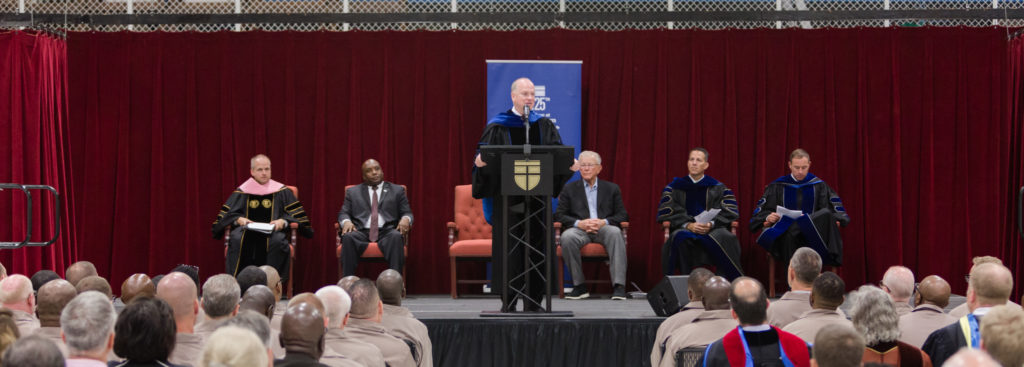North Carolina Field Minister Program celebrates its third year
Lauren Pratt | August 29, 2019

The College at Southeastern (The College) celebrated its third year of the North Carolina Field Minister Program (NCFMP) on Aug. 21, welcoming a total of 70 students to a new school year at the Nash Correctional Institution in Nash County, North Carolina.
“Today we are not just meeting, but we are meeting in a very ceremonial way, to ring in the beginning of an academic school year and to celebrate the third year of this very important and very unique program,” said Seth Bible, director of prison programs for SEBTS and professor of assistant professor of ethics and History of Ideas for The College.
During this year’s convocation service, SEBTS President Danny Akin preached on Romans 12:1-2, challenging students to be set apart for Christ and transformed into his image.
“Consecration made possible by transformation will always result in satisfaction, knowing the will of God,” said Akin, encouraging students to remember this as they seek to prepare for ministry.
The NCFMP started in August of 2017 with partnerships between the North Carolina Department of Public Safety, Game Plan for Life and The College at Southeastern.
To be admitted to the program, an inmate must have at least 12 years remaining on his sentence, have a high school diploma equivalent or higher education and must be in good standing with the prison. During a six-month process leading up to the beginning of fall classes, inmates in the Nash Correctional Institution have the opportunity to apply, provide references, meet for a face-to-face interview and complete a college preparedness exam. After this process has been completed, up to 30 men are chosen for admission. The goal is that a maximum of 30 students will be admitted each semester until capacity is reached with 120 students.
The end goal of the NCFMP is not only to give men hope and purpose while serving out their sentences but also for them to use what they learn in the classroom to impact the culture within the greater prison system of North Carolina.
Upon completion of the Bachelor of Arts in pastoral ministry, graduates will be grouped into teams and assigned to various prisons in the state, where they can hold a range of positions. These can include providing counseling, mentoring new inmates, suicide watch and performing funerals.
“You men are here today because you are indeed right where God wants you to be in his good, in his pleasing and in his perfect will,” said Akin.